النوع الاجتماعي والشمول
يمثل النوع الاجتماعي والعمر والقدرات وغيرها من السمات الفردية أو المتعلقة بالسياق فرصًا وتحديات مختلفة لتقديم المساعدات النقدية والقسائم للأشخاص الذين يعانون من الأزمات بطريقة كريمة.
بين الجهات الفاعلة الإنسانية، هناك اعتراف متزايد بالاحتياجات والقيود المحددة للأشخاص ذوي القدرات المختلفة، وكبار السن، الأشخاص من مختلف الأجناس، وخاصة النساء، والأشخاص المتنقلين. وإلى جانب ذلك، هناك تقدير متزايد للحاجة إلى تدابير مصممة خصيصًا وحساسة تضمن إدماجهم بشكل فعال.
إن دعم احتياجات الأشخاص المتنوعين من خلال المساعدات النقدية والقسائم يتجاوز مجرد جعلهم مجموعة مستهدفة؛ بل يتعلق الأمر بالمشاركة الهادفة، والتصميم والتنفيذ الهادفين، وتعديل البرامج لتلبية احتياجات المجموعات المختلفة بكرامة. وتسير نهج شامل جنبا إلى جنب مع المساعدات التي تركز على الناس.
الأولويات الحالية
ستواصل شبكة CALP تشجيع الجهات الفاعلة في مجال المساعدات النقدية على توسيع نطاق تركيزها لتكون أكثر شمولاً وتدعم فهمًا أعمق لكيفية تجاوز المساعدات النقدية والقسائم إلى ما هو أبعد من فكرة “عدم إلحاق الضرر” نحو تلبية احتياجات مختلف الأشخاص بشكل مناسب وبطرق آمنة وكريمة.
سنعمل على رفع مستوى الخبرات والمبادرات المتعلقة بالمساعدات النقدية والقسائم والنوع الاجتماعي، والمساعدة النقدية الشاملة للأشخاص ذوي الإعاقة، والعمل مع مختلف الأعراق والهويات الثقافية، ومجموعات الأقليات، والأشخاص ذوي الهويات الجنسية المتنوعة، والفئات العمرية.
ستسعى CALP أيضًا إلى جعل عملها متاحًا قدر الإمكان.
محتوى متميز

فيديو التعلم المصغر: المساعدات النقدية والقسائم والنوع الاجتماعي
Blog Post
يُقدم هذا الفيديو نظرة عامة على العلاقة بين النوع الاجتماعي والمساعدات النقدية والقسائم (CVA) التي تتمحور حول دورة المشروع الإنساني، والتي تشمل: التقييم وتحليل الاستجابة: كيفية تعديل عمليات التقييم لتحقيق انعكاس أكثر...

نتائج جندرية أفضل في المساعدة الغذائية من خلال البرمجة التكميلية ومتعددة الوسائط
إرشادات وأدوات
اقُتبست ورقة النصائح هذه من تقرير البحث، «نتائج جندرية أفضل في المساعدة الغذائية من خلال البرمجة التكميلية ومتعددة الوسائط .»
سعت الدراسة إلى الإجابة عن »كيف يمكن لعمليات التصميم 1 والتنفيذ والمراقبة للمشاريع التي...
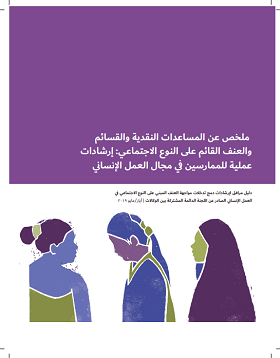
ملخص المساعدات النقدية والقسائم والعنف القائم على النوع الاجتماعي: إرشادات عملية للممارسين في مجال العمل الإنساني
إرشادات وأدوات
الغرض من ملخص المساعدات النقدية والقسائم (CVA) والعنف القائم على النوع الاجتماعي (GBV) هذا هو مساعدة الجهات الفاعلة في مجال العمل الإنساني والمجتمعات المتأثرة من الأزمات والنزاعات على: إدماج الحد من مخاطر العنف القائم...

المساعدات النقدية والقسائم (CVA) المراعية للنوع الاجتماعي توجيهات لضمان النهج المتبع ميدانًيا
إرشادات وأدوات
تبني هذه التوجيهات على طموح منظمة كير من خلال الممارسة والأبحاث والأدلة على المساعدات النقدية والقسائم، وتهدف إلى دعم تطبيق المساعدات
النقدية والقسائم المراعية للنوع الاجتماعي طوال دورة المشروع وعلى مستوى...

كيفية التخفيف من مخاطر العنف القائم على النوع الاجتماعي في المساعدات النقدية والقسائم
فيديو
المساعدة النقدية والقسائم هي أداة مهمة لمساعدة الأفراد المتضررين من الأزمات على الوقوف على أقدامهم. ولكن تمامًا مثل أي شكل آخر من أشكال المساعدة ، من الضروري التأكد من أنه لا يؤجج التوترات في الأسرة أو في المجتمع وأنه...

تعميم إدماج قضايا ذوي الإعاقة في برامج المساعدات النقدية والقسائم
عرض تقديمي
ما هو النهج القائم على الحقوق لذوي الإعاقة؟ كيف يمكن تعميم دمج المعاقين لضمان استجابات إنسانية أكثر شمولاً وفعالية؟ للإجابة على هذه الأسئلة الرئيسية، اجتمعت شبكةCALP، و CBMالعالمية، والمنتدى الأوروبي للإعاقة، والمنظمة...
القيادات المواضيعية
المستجدات

Electronic Transfers in Humanitarian Assistance and Uptake of Financial Services
Report
The Electronic Cash Transfer Learning Action Network (ELAN) undertook case studies on humanitarian electronic transfer (‘e-transfer’) projects in Ethiopia, Zimbabwe and Bangladesh. The case studies examine the extent to which: recipients used digital financial services (e.g. money transfers, savings,...
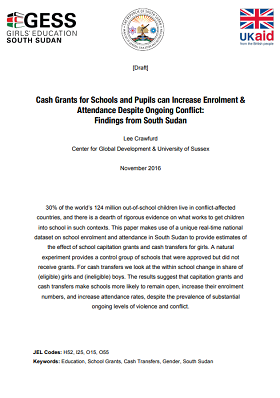
Cash Grants for Schools and Pupils can Increase Enrolment & Attendance Despite Ongoing Conflict: Findings from South Sudan
Report
This paper makes use of a unique, real-time national dataset on school enrolment and attendance in South Sudan to provide estimates of the effect of school capitation grants and cash transfers for girls.

Policy Briefing: Electronic Transfers in Humanitarian Assistance and Uptake of Financial Services
Report
The Electronic Cash Transfer Learning Action Network (ELAN) undertook case studies on humanitarian electronic transfer (‘e-transfer’) projects in Ethiopia, Zimbabwe and Bangladesh. The case studies examine the extent to which: recipients used digital financial services (e.g. money transfers, savings,...
The effect of financial aid from UK Aid Girls’ Education South Sudan programme and EU IMPACT programme to education in South Sudan in 2017
Report
This paper is an update to the previous Girls’ Education South Sudan working paper that looked at the effect of financial interventions (capitation grants and girl’s cash transfers) by Girls’ Education South Sudan, a collaboration of UK Aid and the Ministry of General Education and Instruction,...
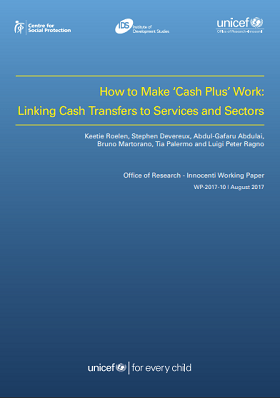
How to Make ‘Cash Plus’ Work: Linking Cash Transfers to Services and Sectors
Report
The broad-ranging benefits of cash transfers are now widely recognized. However, the evidence base highlights that they often fall short in achieving longer-term and second-order impacts related to nutrition, learning outcomes and morbidity.In recognition of these limitations, several ‘cash...

Cash for Education: A global review of UNHCR programmes in refugee settings
Report
This review provides an overview of the use of cash assistance in 45 cash-related education programmes in 21 UNHCR operations. It highlights the key opportunities and challenges with the use of cash for education and provides key direction for future programming and related protection considerations....

Humanitarian Cash Transfers in the Democratic Republic of the Congo: Evidence from UNICEF’s ARCC II Programme
Report
From March 2013 to September 2015, UNICEF and three partner organizations (Concern Worldwide, Mercy Corps, and Solidarités International), collaborated to deliver what was at the time the single-largest unconditional cash transfer programme for humanitarian response in the Democratic Republic of the...

Can Conditional Cash Transfers improve the uptake of nutrition interventions and household food security? Evidence from Odisha’s Mamata scheme
Report
There is considerable global evidence on the effectiveness of cash transfers in improving health and nutrition outcomes; however, the evidence from South Asia, particularly India, is limited. In the context of India where more than a third of children are undernourished, and where there is considerable...
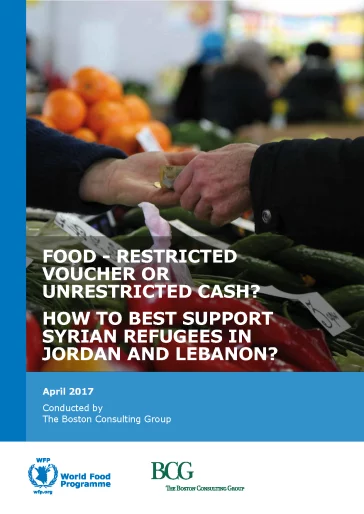
Food – Restricted Voucher or Unrestricted Voucher Cash? How to Best Support Syrian Refugees in Jordan and Lebanon?
Report
The World Food Programme (WFP) plays a pivotal role in the food security of Syrian refugees within the Syria +5 region. WFP periodically reviews its operational approach, so it is timely to consider what the best modality for the next phase of the response might be, including the pros and cons of...

Shock-Responsive Social Protection Systems Research Case Study: Pakistan
Report
This case study presents an overview of the social protection disaster risk management and humanitarian systems in Pakistan, and discusses both Pakistan’s flagship social protection programme, the Benazir Income Support Programme (BISP), as well as emergency cash transfers provided as disaster...
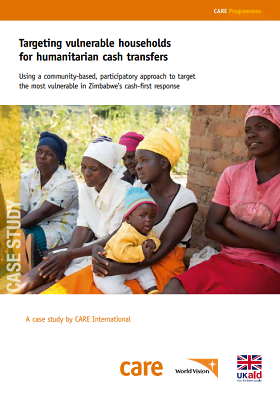
Targeting vulnerable households for humanitarian cash transfers: using a community based, participatory approach to target the most vulnerable in Zimbabwe’s cash-first response
Report
Over 73,000 drought affected households across 15 districts in Zimbabwe received monthly multi-purpose, unconditional cash transfers. With such a large caseload over a wide area, 100% verification of the households would not have been the most resource efficient approach. Moreover, there would have been a...

Community Based Targeting Report
Report
The current study aimed to gain a comprehensive understanding of SEV from the community’s perspective and to assess the targeting practices implemented by cash actors in Lebanon. It demonstrated that, according to the community, HH size had an impact on vulnerability, but that that depended on its...
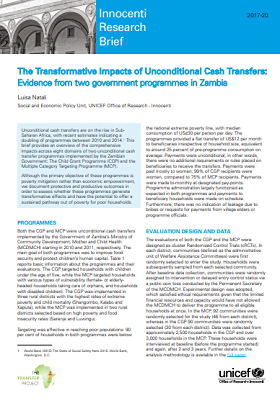
The Transformative Impacts of Unconditional Cash Transfers: Evidence from two government programmes in Zambia
Report
Unconditional cash transfers are on the rise in Sub-Saharan Africa, with recent estimates indicating a doubling of programmes between 2010 and 2014.This brief provides an overview of the comprehensive
impacts across eight domains of two unconditional cash transfer programmes implemented by the...

The Livelihood Impacts of Cash Transfers in Sub-Saharan Africa: Beneficiary Perspectives from Six Countries
Report
Cash transfers (CTs) are a social protection mechanism to reduce the poorest households’ vulnerability to shocks and build human
capital by smoothing consumption and sustaining expenditure on education and social welfare.
This study examines whether and how CTs go beyond welfare objectives to promote...

2016/7 Winter Inter-Agency PDM Report
Report
Between August 2016 and March 2017, fourteen organizations provided more than 140,000 Syrian refugee households in Turkey with assistance to stay warm through the harsh winter season. Organizations delivered winter support to refugees in 52 of Turkey’s 81 provinces, primarily through restricted and...
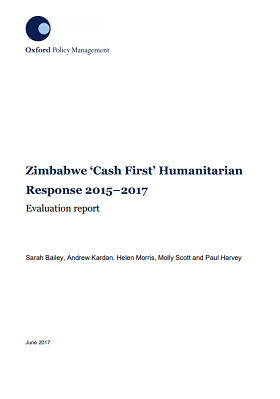
Zimbabwe ‘Cash First’ Humanitarian Response 2015–2017: Evaluation Report
Report
CARE International and World Vision International (WVI) in Zimbabwe implemented the UK Department for International Development (DFID)-funded project ‘Emergency Cash First Response to Drought-Affected Communities in the Southern Provinces of Zimbabwe’ from August 2015 to April 2017. The project...

Scaling-up CTP in Somalia: Reflecting on the 2017 Drought Response
Report
This report summarises discussions that took place during a half-day workshop in September 2017. It built on issues identified as needing action in May, as outlined in the ‘Looking back to move forward: Building on learning from 2011 to strengthen the 2017 drought response in Somalia learning report’.
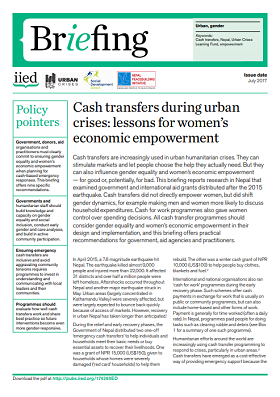
Cash Transfers During Urban Crises: Lessons for Women’s Economic Empowerment
Guidelines and Tools
Cash transfers are increasingly used in urban humanitarian crises. They can stimulate markets and let people choose the help they actually need. But they can also influence gender equality and women’s economic empowerment — for good or, potentially, for bad. This briefing reports research in Nepal...

The Financial Journey of Refugees Full Report
Report
This document details how refugees and migrants from the Middle East, South and Central Asia and East, West and North Africa finance their journeys and manage money along the way.

Can E-Transfers Promote Financial Inclusion in Emergencies: A Case Study from Ethiopia
Report
The Electronic Cash Transfer Learning Action Network (ELAN) launched this research to build an evidence base around connecting emergency electronic transfer (e-transfer) recipients with additional financial
services. They also wanted to learn if, when, and how e-transfers can promote sustained uptake and...



